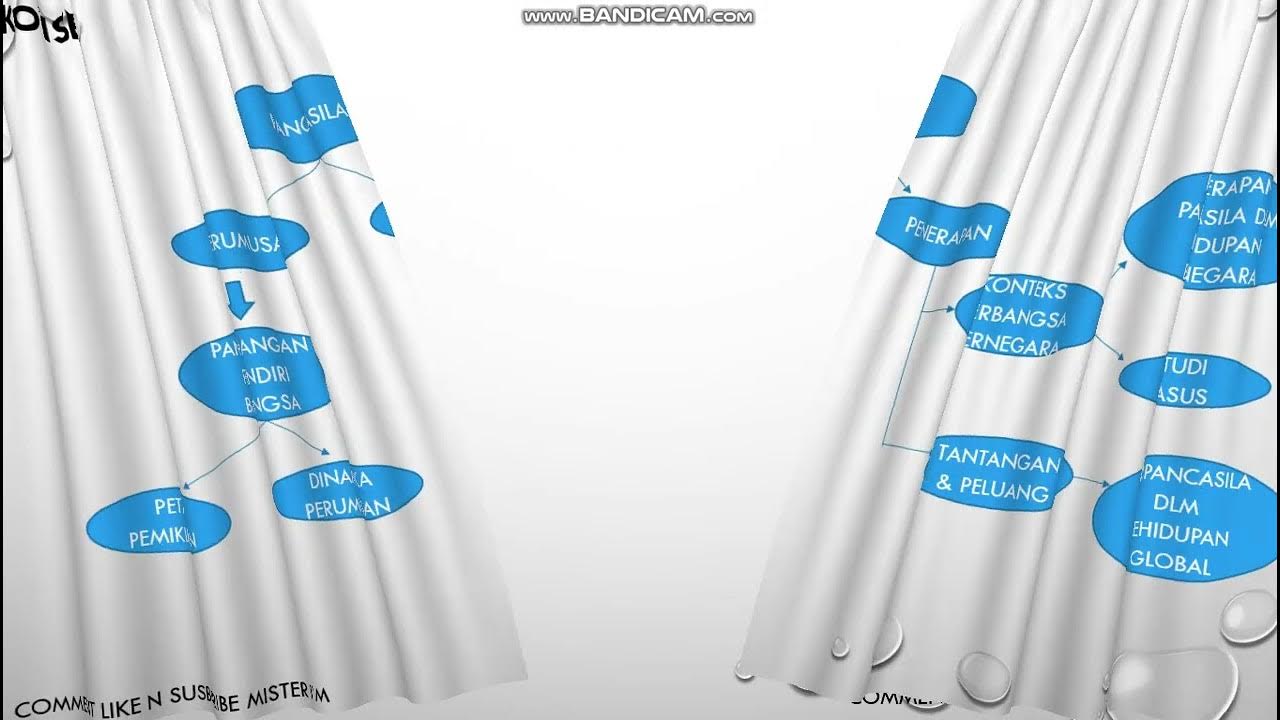Pancasila Sebagai Dasar Negara | Hipotesa X Geolive
Summary
TLDRThe video explores the significance of Pancasila, Indonesia's state ideology, established by founding father Soekarno. It highlights the five principles: nationality, internationalism, consensus, social justice, and divinity. These values, rooted in Indonesia’s historical context, have guided the country through numerous challenges. The script also addresses how Pancasila evolved, including changes to the Jakarta Charter, and the importance of keeping Pancasila relevant to modern generations. It suggests that openness to debate and dialogue about Pancasila is key to preserving its relevance and ensuring it remains a living value in society.
Takeaways
- 🎉 Indonesia celebrates its independence day on 17 August, marking 74 years of independence.
- 💪 Despite various challenges such as military aggression, poverty, and separatism, Indonesia has remained strong due to its adherence to Pancasila.
- 🛡️ Pancasila serves as the foundational state ideology of Indonesia, ensuring national stability and guiding laws and policies.
- 📜 The concept of Pancasila was first proposed by Soekarno on 1 June 1945 during the BPUPKI meeting, with the aim of creating a solid national philosophy.
- 🌍 The five principles of Pancasila include nationality, internationalism, consensus, social justice, and divinity.
- 🙏 The first principle emphasizes the belief in a higher power while respecting all religions, as seen in the adjusted version of the Jakarta Charter.
- 🤝 Soekarno stressed that Pancasila reflects Indonesia’s unity in diversity, advocating cooperation and consensus among different ethnic and religious groups.
- 📢 There is concern that Pancasila can be used as a tool for authoritarian regimes to suppress dissent under the guise of protecting the ideology.
- 🧠 In the modern age, Pancasila must remain relevant by allowing younger generations to debate and reinterpret its meaning.
- 💬 Encouraging open discussion, dialogue, and creativity regarding Pancasila is essential to keep it meaningful in contemporary Indonesian society.
Q & A
What is the significance of 17 August for Indonesia?
-17 August is celebrated as Indonesia's Independence Day, marking the proclamation of Indonesia as an independent country 74 years ago.
What challenges did Indonesia face after its independence?
-After independence, Indonesia faced military aggression, cold war tensions, poverty, and separatist movements.
What is Pancasila, and why is it important to Indonesia?
-Pancasila is the state ideology of Indonesia, consisting of five principles. It is considered the highest legal and philosophical source in Indonesia and serves as the foundation for all laws and national decisions.
When was the idea of Pancasila first introduced?
-The idea of Pancasila was first introduced on 29 May 1945 during a BPUPKI meeting, where discussions about the state ideology of an independent Indonesia began.
Who was the main proponent of Pancasila, and how did they develop the concept?
-Soekarno, Indonesia's first president, was the main proponent of Pancasila. He had been thinking about a state ideology since 1918, drawing inspiration from ideologies like San Min Chu (China), materialist history (Soviet Union), and Islam. He eventually proposed five principles for Indonesia.
What are the five principles of Pancasila as proposed by Soekarno?
-The five principles are: 1) Nationalism, 2) Internationalism, 3) Consensus or democracy, 4) Social justice, and 5) Divinity.
How did Soekarno define the principle of nationalism for Indonesia?
-Soekarno believed that Indonesia must be a united nation encompassing all its people, regardless of ethnicity, religion, or culture. He emphasized that Indonesia has 'natural' borders and must be a single nation within those borders.
What role does internationalism play in Pancasila?
-Internationalism in Pancasila represents love for world peace and respect for other nations. According to Soekarno, Indonesia must not only prioritize its national interest but also contribute to global harmony.
What controversy surrounded Pancasila during the drafting of the Jakarta Charter?
-Initially, the Jakarta Charter included an obligation for Muslims to uphold Islamic law. However, this was controversial, and national figures like Moh Hatta and Ki Hajar Dewantara worked to revise it. In the final version, this obligation was replaced with a more inclusive principle: Belief in the Almighty God.
How should Pancasila be treated in the modern age, especially for younger generations?
-Pancasila should not be treated as a distant or authoritarian concept. It should be open to interpretation, dialogue, and debate by younger generations to remain relevant and meaningful in modern society.
Outlines

Cette section est réservée aux utilisateurs payants. Améliorez votre compte pour accéder à cette section.
Améliorer maintenantMindmap

Cette section est réservée aux utilisateurs payants. Améliorez votre compte pour accéder à cette section.
Améliorer maintenantKeywords

Cette section est réservée aux utilisateurs payants. Améliorez votre compte pour accéder à cette section.
Améliorer maintenantHighlights

Cette section est réservée aux utilisateurs payants. Améliorez votre compte pour accéder à cette section.
Améliorer maintenantTranscripts

Cette section est réservée aux utilisateurs payants. Améliorez votre compte pour accéder à cette section.
Améliorer maintenantVoir Plus de Vidéos Connexes
5.0 / 5 (0 votes)






